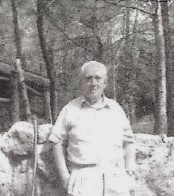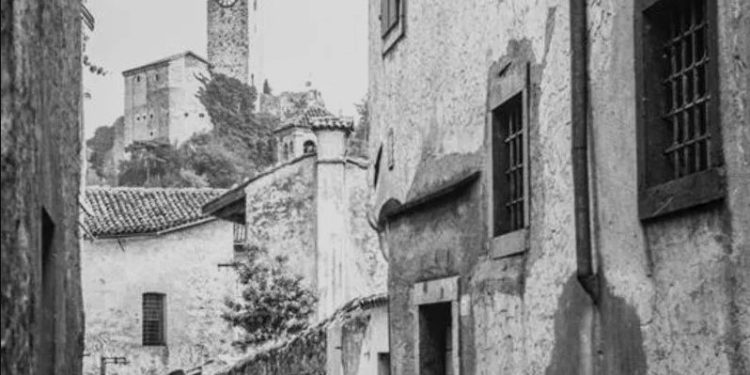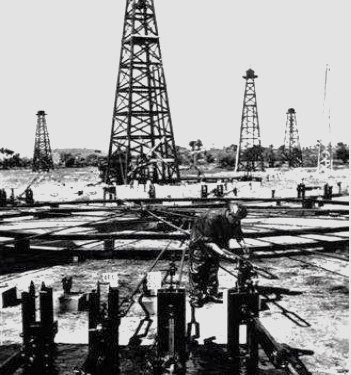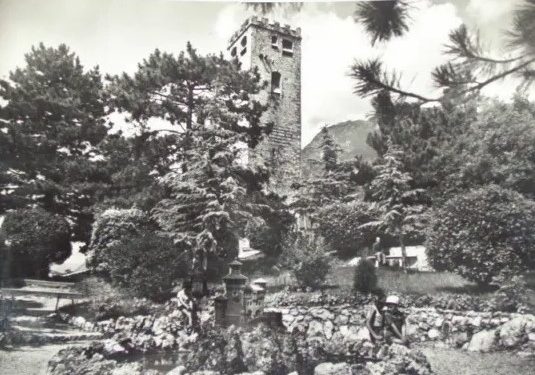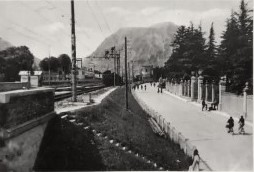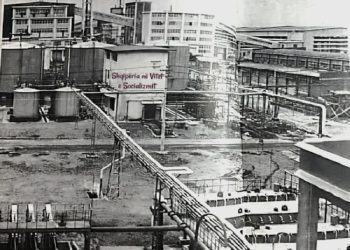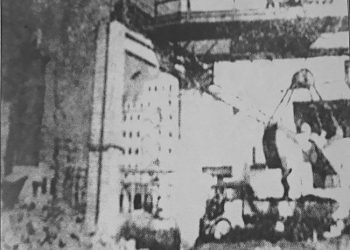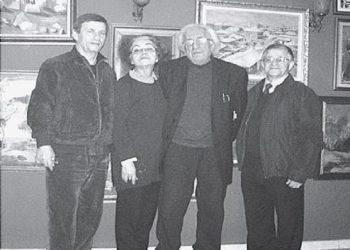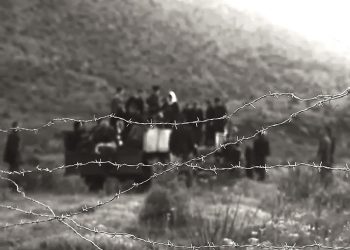By Arnaldo Canciani
Part seven
Memorie.al / This first part of my memoirs, which covers a period of twenty years; 1928 – 1949, I dedicate it to all those who have lived and suffered like me in Albania, to the inhuman privations and sacrifices of my parents and my entire family. I extend my dedication to the many Africans forced to emigrate in search of better living conditions, to all the soldiers who were forced to fight in a foreign country for fleeting ideals and, many of them, who never saw their families again and are buried in a foreign country, to all those who are oppressed by dictatorial regimes and those unjustly sentenced to death, to the prisoners, to those who have suffered unimaginable torture.
Continues from the previous issue
Before we left, we had deposited our small savings, accumulated during our last period of stay in Albania, in a bank in Tirana. The export of currency was not allowed, nor was it possible to exchange it for another currency, and even if we were allowed to take the fruits of our labor in Albanian currency, there was no exchange rate or value in Italy.
The fact that we had no means of support or work to secure them, we had no alternative solution. This forced us to stay and wait for the bureaucratic processes and finally, we were given the opportunity to receive aid for the first months, allowing a gradual reintegration to face the Italian post-war situation.
Compared to others, we could consider ourselves lucky; our home in Gemona was the final goal, representing for us a safe point of reference. The “Internacional” Hotel in Brindisi was located on the port quay opposite all the moored ships, to the left of the inhabited area of Kazale.
My family was placed in a spacious bedroom. Throughout the day, we took long walks and explored the city. People looked at us with curiosity, as if we had come from another planet. Our numb faces, frightened looks, and clothing that was certainly not in fashion – women dressed in long robes down to their ankles – in Brindisi, my sister Albina’s was still above her knee, so the discomfort was unavoidable. We spent long hours sitting in the port cafe; in front of us, large and small ships and, on the horizon, a large sea that for many years we had been waiting to cross.
Mr. Vito, the owner of the bar, like most of the locals from Puglia, was a person who understood and had a good heart; he did not require us to drink, as he knew that the amount of our money was very limited.
The Refugee Camp in Latina
The stay in Brindisi lasted fifteen days. On the evening of May 7, they escorted us to the station, and the next morning we arrived at the refugee center in Latina. The town was 9 km away from the station. The refugees were housed there, and it was located on the outskirts, near the stadium. They called it “Palace M,” probably in homage to Mussolini.
This was a large structure, only with the outer walls; inside it was empty, the support pillars that had ropes stretched and tied at a height of two meters looked like coverings, replacing the dividing walls and surrounding the space occupied by different families, equipped only with beds to sleep in.
During the day, we had to speak in a low voice to maintain our privacy; at night, we could hear a concert of voices. We had fallen from the frying pan into the fire! We had surrendered and were convinced that this was the last test to pass before we could start living again. Most of the friends at this center were Istrian refugees, who came from Yugoslavia, where they were all abandoned, having fled Tito’s communist regime.
Everyone had the same question: when, how, and where they could rebuild their lives. I had gone to Rome twice, to the AGIP headquarters, to look for a job, but I received vague promises. Finally, after about two months, we received the certificate from the Ministry of Interior, with the status of refugees, which allowed us to leave the center, with the protective measures provided by law.
On June 8, 1949, we left Latina for Friuli.
Arrival in Gemona
On July 9, 1949, after twenty-two years in Albania, my father saw his homeland, “Gemona Del Friuli.” When we arrived at the station, I looked at it with longing and remembered some verses of an anonymous poet:
“Beautiful Gemona, situated on the gentle slope of the green pastures, stretching out in the fantastic head of fairies, which crown the rocks and kiss the wind, the silvery expanse of her, the mantle of the abandoned valley, whispering with fatigue, the legend from the Alps to the Tagliamento.”
My ancestors’ house was very old; it had some rooms built in later times, but not very large. During our absence, it had been rented by the Ferragoto Maria family, who had two married daughters with children, who joined their husbands in Argentina, a few months after our arrival.
With a minimum of sacrifice, we managed to accommodate ourselves without evicting them, which would have created serious problems for the tenants. For me, it was time to start a new life, in a free country, that had created a new democratic system.
Unfortunately, there were many difficulties to overcome; the war had left deep wounds, the reconstruction was not showing signs of recovery, and the economy was in crisis. One of the most serious problems was unemployment. There were more than two million unemployed, and in regions with little industry, such as Friuli, the chances of finding work were almost nonexistent.
Many were forced to follow in their fathers’ footsteps and emigrate. I had made many efforts in various industries, knocked on many doors, but despite my twelve years of experience in the workshop, I had not received any results. Initially, the subsidy given to refugees was a help, but then it was suspended and the few accumulated resources did not last long. My father was forced to sell the land he had inherited from his mother.
My mother had to give up a small property in the field of Tabogas Gemona. For a period of about two months, my father accepted a job that for his age was very heavy: cleaning the irrigation canals.
I, too, thanks to the help of my neighbor, Antonio Collini, with whom a good friendly relationship was born, was offered a temporary job for three months at the hospital for the renovation of some pavilions. This comforted and helped, raising my morale a little, but the future had not changed. “Look, brother, how my days went, sad, lonely, and empty!”
The Last Hope
All efforts had been made to find a job. In July 1950, taking advantage of the price cuts made by the railways on the occasion of the Holy Year, I went to Rome, to the General Directorate of AGIP.
Within three months of my stay in Latina, I had gone several times to ask the superiors for a return to AGIP, but at that time, the government fired Parri and had appointed Enrico Mattei to liquidate all the company’s assets in Italy and abroad.
At that time, AGIP was the only state-owned oil company operating in Italy and in some foreign countries. After the war, all exploration activities were suspended everywhere. The old leaders were against these decisions; the documents and previous experiences were convincing to have good prospects for hope.
Mattei is credited with having given his consent to make one last effort before closing. His past as a partisan, his acquaintances within the Democratic Party and some members of the government, made his task easier.
With Eng. Zanetini, Trisoglio, and several other experienced veterans, he was tasked with the duty of starting new research: materials, equipment, and a newly assembled drilling rig were obtained to start immediately after the end of the war, to drill a second exploration well in Caviaga, near Lodi, which proved productive, confirming the results of the first well.
He had discovered considerable methane gas reserves in the deposit in the Po Valley. I returned from my trip to Rome, more confident, and with greater hope, than all the time I was waiting!
I spent my days with the illusion that something new might happen, I avoided thinking about the past, I sought more short adventures to alleviate the suffering caused by uncertainty and disappointments.
Tired of waiting for good news, I sought to emigrate to Venezuela, where some villagers had fled before me; the documentation was almost ready when I heard the news from my brother-in-law Camoni that some former colleagues had been hired by AGIP, which had begun to selectively take in some workers from its former staff.
December 1950: I Was Hired by AGIP, in Crema
At that time, in the municipality of Gemona, the democratic senator Fantoni held the position of mayor. I went to him, who was already aware of my situation, and I asked him to write a letter to Eng. Mattei. I have never liked recommendations, but this was my last desperate attempt to do the impossible, and it was the beginning of a radical change in my life. Fate suddenly appeared to me, with a new face.
On November 25, my birthday, I received a letter from the AGIP management, informing me of my placement at the Caviaga construction site, starting from December 30, 1950. November 30 was spent on preparations for the trip, in a state of mind disturbed by conflicting feelings, happy that the long wait was finally over, a return to work to build a future, but also afraid of the unknowns that awaited me.
Despite the suffering and experience, I felt like a bird that has left the nest and is ready for its first flight, knowing that I would have to face life alone. I would miss the family support, advice, and help in difficulties, which are needed in the most difficult hours and are so dear.
Accompanied by my parents and relatives, I went to the station in the evening; it was a custom then to give a final farewell at the bar “at Rosina’s” (Rosina’s), in front of the station, where the emigrant offered the last glass of farewell to all his friends.
At eight in the evening, I got on the train, which I had seen many times when I was going home and which accompanied a dream that had not been realized. At that moment, the old truth appeared to me, saying that; “The one who has left and the one who is dead”!
Manzoni, in the promises of marriages, perfectly describes the feelings that agitate the soul of those who are forced to leave their country and what is most dear: “Farewell Mountains, water springs, unequal and high peaks, that rise to the sky that load in his mind, no less than this is his appearance with his family.
Streams, which hold the cry, like the noise of the voices of the house. Scattered and bright villas on the slope like a flock in the pasture…”! These were the thoughts that passed through my mind, now clarified after fifty years, that I am writing them.
The train arrived in the morning at the Milan station, and my thoughts were interrupted. I changed trains and continued the journey to Lodi; from here I took the small village courier, Caviaga. In the offices provisionally arranged in the Barracks, which looked like the personnel offices I had in Devoll in Albania. In the offices, temporarily located in a barrack, I met a staff, an office employee, whom I had known in Devoll, in Albania; he was a librarian.
He told me that I had to report the next day to Crema, where a new construction site was being built. I remembered that one day, doing a crossword puzzle, there were questions: “Sweet city in Lombardy,” the word “Krem,” this was the first time I was familiar with it. I have often wondered if this was a sign of fate, or just a coincidence! I finally arrived at my destination, and on December 2, I started working. The sheds were finished, but empty; the machinery had not yet been installed. The canteen and dormitories were under construction.
I was forced to look for temporary accommodation arrangements. Oreste Kurzeli, a former collaborator in Albania who had come to AGIP before me, helped me. For food, we went to Piazza Duomo, to a restaurant called Bellomo; Ermelinda, the manager’s daughter, was my first friend in Crema.
The first month passed, with many difficulties and the difficulties of integration. At Christmas, I was a guest in Milan, at the dei Floreani, my father’s relatives. I really wanted to go to Gemona and spend the holidays with my family, but I lacked the means and had a few days off. The hours of the train journey were too many.
So I spent New Year’s alone in a hotel room meditating, owning a car was a dream at that time. Prosperity came gradually, at the cost of privations and sacrifices. For the young people of today, it is easy. They have everything! They have a lot! It has been 57 years since then, in my cardboard suitcase, there are only old things, photos and writings yellowed by time…!
Conclusions
And more than a year has passed since I started to search and research documents, even though at the beginning I dug through the drawers of my mind for memories, dating from the twenties to the fifties of the last century. Most of the people who have lived the events of this period with me and are mentioned in these memoirs have disappeared.
I wanted to include in this book of memoirs, even the photos of many friends, who lived in different cities of Italy, whose faces I remembered. Many others I recognized in some photos, but their names have disappeared from the oblivion of memory and do not appear in my photos. The faded images are the result of the age of the photographs, which date from 50-70 years ago.
The results of this volume are interesting for the historical memories transmitted. It was not possible to comply with printing and publishing standards. The photos shown are included only in the original volumes which, for reasons of confidentiality, are available only for the exclusive use of the family.
This first part of my memoirs has been removed from the original; a copy is submitted only for reading to the Archive Diary, National Foundation (Pieve Santo Stefano, Arezzo), to preserve the memory of Italians. /Memorie.al
Arnaldo Canciani, Cream, November 19, 2001.




